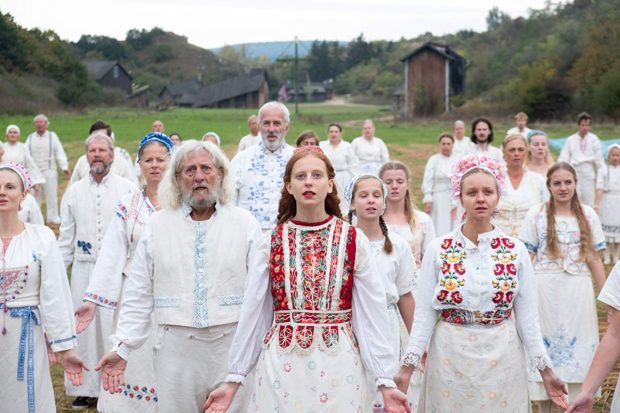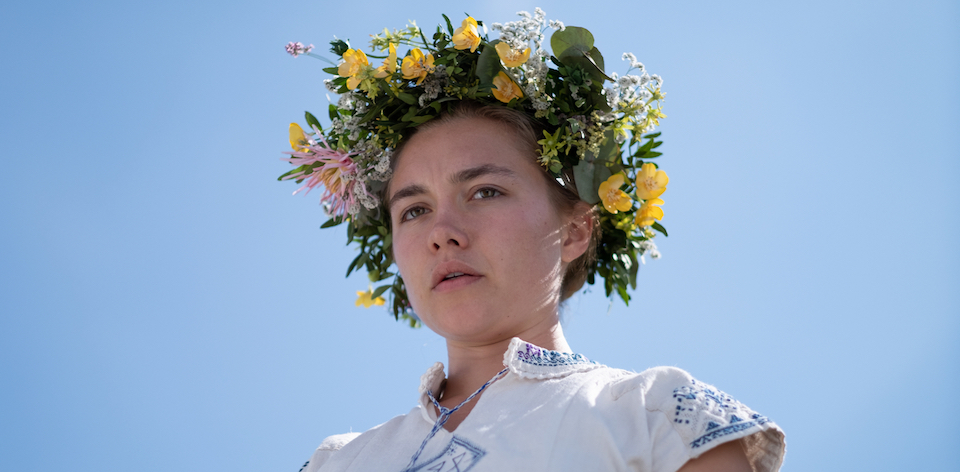MIDSOMMAR is already one of the most talked-about films of the year. Coming off the back of the cult success of Hereditary, director Ari Aster’s sophomore effort takes the obvious path from Utah to Sweden.
Opening like a Disney storybook, complete with an ornate narrative wall, the tranquillity of the woods is shattered by the ringing of a phone. It’s a signal to expect the unexpected in a film that offers a series of visually led shocks. It might be sold as a horror film, but it’s the home truths that are the most disturbing.
Recovering from a traumatic collective of deaths in her family, Dani (Lady Macbeth‘s Florence Pugh, in a star-making role) accompanies her reluctant boyfriend Christian (Jack Reynor), and his friends Mark (William Jackson Harper) and Josh (Will Poulter), to a pagan festival in Sweden that only occurs once every 90 years.

Aster’s film is a masterclass in mood. Before we learn the nature of Dani’s tragedy, for instance, all we hear are her screams of anguish down a telephone line. From the start, recurring motifs become visual portents of doom: the camera pushing out windows into nature, and conversations conducted through mirrors speak to the duality play and ultimate reversal of power that Aster is foreshadowing.
When the scene switches to Sweden, it’s even more disturbing because the lights are on the whole time. The creative triptych of director Aster, cinematographer Pawel Pogorzelski (Hereditary) and composer Bobby Krlic (aka The Haxan Cloak) introduce us to the audio-visual twists and turns of hallucinogens so gradually that we don’t quite believe what we are seeing for much of the back half of the movie.
There are a few “gross out” moments that maybe push the envelope a little too far and break the magic spell Ari Aster is weaving, especially if you feel that they mischaracterise traditional paganism. It’s also difficult not to acknowledge the controversy around the addition of Ruben (played by Hungarian newcomer Levente Puczkó-Smith), a character who is the product of inbreeding that has been accused of being ableist. The film makes compelling arguments in each direction, and Aster certainly imposes not negative stereotypes around either Ruben or Swedish traditions more broadly.

Yet it’s hard to imagine this building to a more perfect conclusion, one that only the most vile of reviewers would even think about discussing outside of a big red spoilers box. Suffice it to say that the film is ultimately not about horror, the cults, or even the benefits of well-maintained doses of mushrooms. It’s about breaking up, and the importance of having a loving community to share your pain. In this sense, viewers may find some kind of joy instead of terror by the film’s gripping conclusion.
At the time of writing, a 171-minute director’s cut is doing the rounds on the special screening circuit, and will no doubt find its way to home release at some stage. As the theatrical cut is one of the tightest and most effective slices of modern filmmaking this year, any bonus scenes could potentially feel extraneous. Ultimately, this is kind of like a 21st century version of The Wicker Man, the 2006 version of The Wicker Man notwithstanding, and an impeccably shot and atmospheric film from start to finish.
2019 | US | DIRECTOR: Ari Aster | WRITERS: Ari Aster| CAST: Florence Pugh, Jack Reynor, William Jackson Harper, Vilhelm Blomgren, Will Poulter | DISTRIBUTOR: Roadshow Films (AUS) | RUNNING TIME: 147 minutes | RELEASE DATE: 8 August 2019 (AUS)





